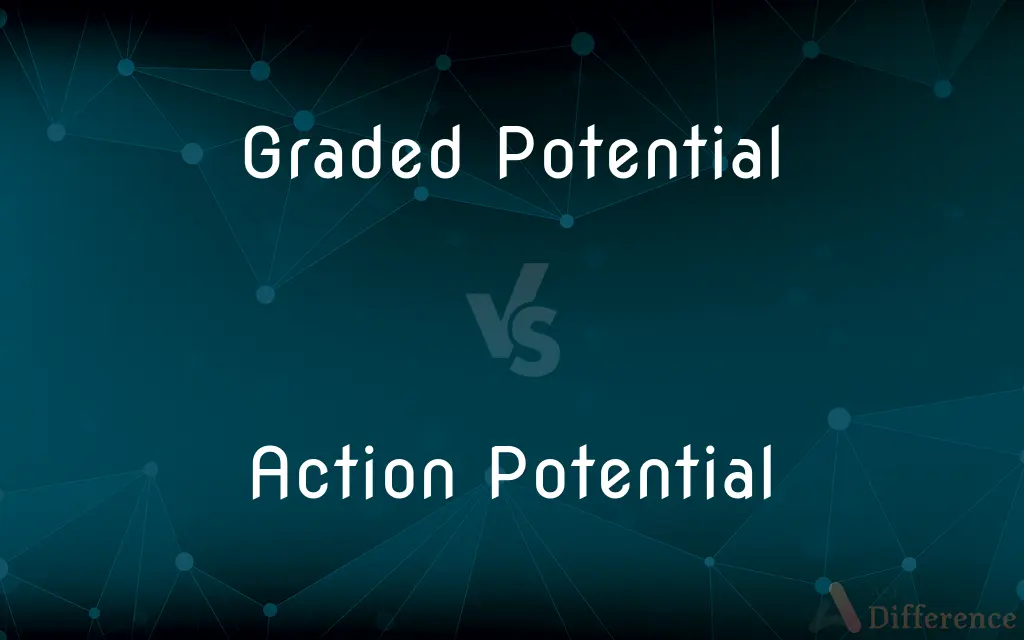Graded Potential vs. Action Potential — What's the Difference?
Edited by Tayyaba Rehman — By Fiza Rafique — Published on December 16, 2023
Graded Potential is a variable-strength signal that decreases with distance; Action Potential is a fixed-strength signal transmitting over long distances.

Difference Between Graded Potential and Action Potential
Table of Contents
ADVERTISEMENT
Key Differences
Graded Potential and Action Potential are both crucial elements of neuronal communication. Graded Potentials are temporary shifts in the neuronal membrane's voltage, while Action Potentials are all-or-none events that travel the length of the neuron.
Graded Potentials can vary in amplitude and occur in the dendrites and cell body. In contrast, Action Potentials are uniform, rapid depolarization and repolarization events that typically originate at the axon hillock and propagate down the axon.
Graded Potentials result from the opening and closing of ligand-gated ion channels, leading to a transient change in membrane potential that can be either depolarizing or hyperpolarizing. Conversely, Action Potentials arise due to the sequential activation of voltage-gated sodium and potassium channels.
The intensity of the stimulus determines the magnitude of the Graded Potential. A stronger stimulus results in a larger Graded Potential. However, Action Potentials are uniform events where the strength of the stimulus is represented by frequency, not amplitude.
Graded Potentials lose strength as they spread across the membrane, meaning they can't travel long distances. On the other hand, Action Potentials, once initiated, propagate without decreasing in strength, allowing signals to be sent over long distances.
ADVERTISEMENT
Comparison Chart
Origination Location
Dendrites and cell body
Axon hillock and axon
Strength Variation
Variable strength depending on the stimulus intensity
Fixed strength; all-or-none
Channel Type Involved
Ligand-gated ion channels
Voltage-gated sodium and potassium channels
Distance Travelled
Decreases with distance, localized
Travels long distances without decreasing in strength
Representation of Stimulus Strength
Magnitude represents stimulus strength
Frequency represents stimulus strength
Compare with Definitions
Graded Potential
Short-lived, diminishing signals.
The Graded Potential weakened as it moved across the cell membrane.
Action Potential
Propagates without loss of strength.
The Action Potential traveled down the axon to the synapse.
Graded Potential
Can be either depolarizing or hyperpolarizing.
The inhibitory neurotransmitter caused a hyperpolarizing Graded Potential.
Action Potential
Represents signal transmission in neurons.
The frequency of Action Potentials indicated the intensity of the sensory input.
Graded Potential
A variable response based on stimulus strength.
The intense heat resulted in a larger Graded Potential in the sensory neuron.
Action Potential
Involves specific voltage-gated ion channels.
The opening of sodium channels initiated the upswing of the Action Potential.
Graded Potential
A transient change in membrane voltage.
The neuron exhibited a Graded Potential in response to the light touch.
Action Potential
A rapid, all-or-none neuronal electrical signal.
The neuron fired an Action Potential in response to the stimulus.
Graded Potential
Localized voltage shifts in dendrites and cell bodies.
Ligand binding at the receptor triggered the Graded Potential.
Action Potential
Initiated by depolarization that reaches the threshold.
Once the threshold was crossed, the neuron generated an Action Potential.
Common Curiosities
How is an Action Potential different from a Graded Potential in terms of propagation?
An Action Potential propagates without loss of strength, while a Graded Potential diminishes as it spreads.
What is a Graded Potential's primary function in neurons?
Graded Potentials help determine whether an Action Potential will be generated by bringing the membrane potential closer to or further from the threshold.
Can both Graded Potentials and Action Potentials be hyperpolarizing?
Only Graded Potentials can be hyperpolarizing; Action Potentials are depolarizing events.
What role do voltage-gated channels play in an Action Potential?
Voltage-gated channels sequentially open and close to facilitate the rapid depolarization and repolarization of an Action Potential.
What initiates a Graded Potential in a neuron?
Graded Potentials are initiated by the binding of neurotransmitters to ligand-gated ion channels.
How does a neuron "decide" to generate an Action Potential?
If a Graded Potential brings the membrane voltage to a threshold level, an Action Potential is generated.
Why are Action Potentials considered "all-or-none"?
Because they either occur with a full response or not at all, regardless of the stimulus's strength.
Can Graded Potentials generate an Action Potential?
Yes, if a Graded Potential is strong enough to bring the membrane to threshold, it can trigger an Action Potential.
Why don't Graded Potentials travel long distances?
Graded Potentials lose strength as they spread across the cell membrane.
What happens when an Action Potential reaches a synapse?
When an Action Potential reaches a synapse, neurotransmitters are released into the synaptic cleft.
Where are Graded Potentials typically observed in a neuron?
Graded Potentials commonly occur in the dendrites and cell body of a neuron.
How does the frequency of Action Potentials relate to stimulus intensity?
A stronger stimulus often leads to a higher frequency of Action Potentials.
What happens during the refractory period of an Action Potential?
During the refractory period, the neuron cannot generate another Action Potential or has a higher threshold.
Can a neuron have multiple Graded Potentials simultaneously?
Yes, a neuron can experience multiple Graded Potentials from different inputs, which can summate.
How do Graded Potentials vary in strength?
Graded Potentials vary based on the intensity of the stimulus that initiated them.
Share Your Discovery

Previous Comparison
Canola Oil vs. Corn Oil
Next Comparison
Traditional Trade vs. Modern TradeAuthor Spotlight
Written by
Fiza RafiqueFiza Rafique is a skilled content writer at AskDifference.com, where she meticulously refines and enhances written pieces. Drawing from her vast editorial expertise, Fiza ensures clarity, accuracy, and precision in every article. Passionate about language, she continually seeks to elevate the quality of content for readers worldwide.
Edited by
Tayyaba RehmanTayyaba Rehman is a distinguished writer, currently serving as a primary contributor to askdifference.com. As a researcher in semantics and etymology, Tayyaba's passion for the complexity of languages and their distinctions has found a perfect home on the platform. Tayyaba delves into the intricacies of language, distinguishing between commonly confused words and phrases, thereby providing clarity for readers worldwide.
















































